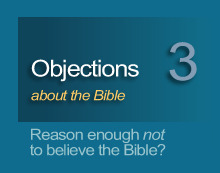WHY THIS?
An atheist posed this question to me that I wish more so-called liberal Christians would consider.
(Answer: it can't!)
"If one has to make decisions about what or what not to accept in the Bible as true, how can it be trusted as authoritative"
RESPONSE:
Good question, but not for me. I believe it all to be true; parts literally, parts figuratively.
It really varies from church to church, but this is a tough one for many Methodists, Episcopalians, a growing number of Presbyterians, and others who don't uniformly accept the total teachings of the Bible. Their teachings tend to emphasize pragmatism; or if I may sum them up crudely: better living through whatever-the-hell works and, oh-by-the-way, thank God.
Consider also this proposition by Gleason Archer. Not a complete argument in and of itself, but intriguing nonetheless:
In the last analysis, then, every man must settle for one of two alternatives: the inerrancy of Holy Scripture, or the inerrancy of his own personal judgment. If the Bible contains errors in the autographa, then it requires an infallible human judgment to distinguish validly between the false and the true in Scripture; it is necessary for every affirmation in the sacred text to receive endorsement from the human critic himself before it may be accepted as true. Since men disagree in their critical judgments, it requires absolute inerrancy on the part of each individual to render a valid judgment in each instance. Even the agnostic must assert for himself such infallibility of judgment, for he cannot logically assume an agnostic position unless he can affirm that he has surveyed all the evidence for the authority of Scripture and has come to a valid judgment that the evidence is insufficient to prove the divine authority of the Bible as the Word of God. These, then, are the only alternatives available to us as we confront the Scriptures: either they are inerrant, or else we are. 12



Expanded!